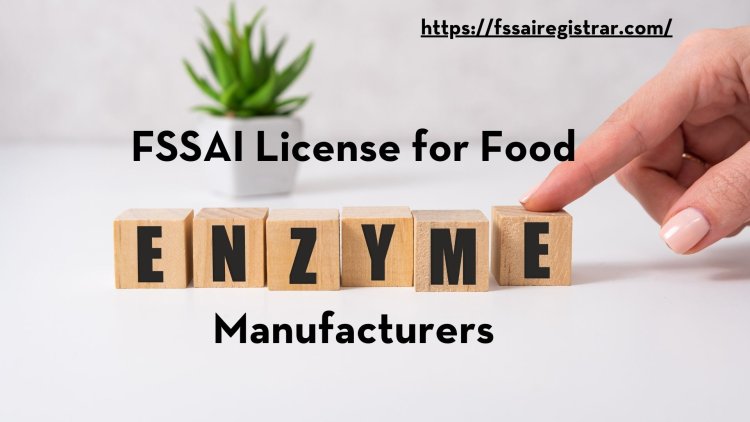FSSAI License for Food Enzyme Manufacturers
Share this Post to earn Money ( Upto ₹100 per 1000 Views )

In the intricate world of food manufacturing, where precision and innovation converge, the role of food enzymes is indispensable. These biochemical catalysts play a pivotal role in enhancing the texture, flavor, and nutritional profile of various food products. As custodians of this critical aspect of food production, food enzyme manufacturers are subject to stringent regulatory standards to ensure the safety and quality of their products. The FSSAI License for food enzyme manufacturers emerges as a crucial component in navigating the intricate landscape of quality assurance, safety protocols, and regulatory compliance.
1. The Significance of Food Enzymes:
Food enzymes are natural substances that accelerate chemical reactions in food production processes. They are essential in activities such as fermentation, aging, and ripening, contributing to the overall sensory and nutritional attributes of food products. Given their integral role, the safety and quality of food enzymes are paramount, necessitating robust regulatory oversight.
2. Regulatory Framework and FSSAI:
The FSSAI serves as the regulatory authority overseeing the safety and standards of food products in India. For food enzyme manufacturers, obtaining an FSSAI licence is not just a legal requirement but a commitment to upholding the highest standards of safety, quality, and transparency in the manufacturing process. The FSSAI framework provides a comprehensive set of guidelines and regulations that manufacturers must adhere to, covering aspects such as hygiene, labeling, and quality control.
3. Types of FSSAI License for Food Enzyme Manufacturers:
FSSAI offers different types of licences based on the scale and nature of food business operations. Food enzyme manufacturers typically fall under the purview of the FSSAI Central License or FSSAI State License, depending on factors such as turnover, production capacity, and the geographical extent of operations. Each type of licence comes with specific requirements, and manufacturers must choose the one that aligns with the nature and scale of their operations.
4. Application Process for FSSAI License:
The application process for obtaining an FSSAI licence for food enzyme manufacturing involves several key steps:
a. Documentation:
Manufacturers must compile and submit a set of documents, including proof of identity, address, and details of the food business. Additionally, documents related to the production process, quality control measures, and a comprehensive food safety management plan must be included.
b. Form Submission:
The application is submitted to the relevant FSSAI authority, whether at the local, state, or central level. The form submitted varies based on the type of licence being sought.
c. Verification and Inspection:
FSSAI authorities conduct verification and may carry out inspections to ensure that the manufacturing facilities comply with hygiene, safety, and quality standards.
d. Licence Issuance:
Upon successful verification, the FSSAI licence is issued to the food enzyme manufacturer. The licence contains a unique FSSAI registration number that must be displayed on product labels.
5. Compliance with Good Manufacturing Practices (GMP):
Food enzyme manufacturers obtaining an FSSAI licence commit to complying with Good Manufacturing Practices (GMP). GMP encompasses a set of guidelines and practices that ensure the consistent production and quality of food products. For food enzyme manufacturers, adherence to GMP is critical in maintaining the integrity and safety of the enzymes produced.
6. Implementation of Hazard Analysis and Critical Control Point System:
The FSSAI licence necessitates the implementation of a Hazard Analysis and Critical Control Point (HACCP) system. HACCP is a systematic approach to identifying, assessing, and controlling potential hazards at various stages of the manufacturing process. This proactive system ensures that risks related to food safety are identified and mitigated, contributing to the overall safety and quality of food enzymes.
7. Assurance of Product Safety:
The FSSAI licence for food enzyme manufacturers serves as a robust assurance of product safety. Consumers, distributors, and regulatory bodies recognize the FSSAI mark as a testament to the manufacturer's commitment to adhering to the highest safety standards. This assurance is particularly crucial in an era where consumers are increasingly conscious of the safety and quality of the food products they consume.
8. Market Access and Consumer Trust:
Having an FSSAI licence opens doors to broader market access for food enzyme manufacturers. Many retailers, distributors, and consumers actively seek products that carry the FSSAI mark, considering it a seal of trust. This market recognition not only enhances the credibility of manufacturers but also contributes to the overall competitiveness of their products.
9. Legal Compliance and Risk Mitigation:
The FSSAI licence is not just a legal requirement; it is a proactive measure for risk mitigation. Non-compliance with food safety regulations can lead to legal consequences, including fines, product recalls, and suspension of the licence. By obtaining and maintaining the FSSAI licence, food enzyme manufacturers mitigate legal risks and position themselves as responsible and compliant contributors to the food industry.
Suggested Read : foscos fssai
Conclusion:
In conclusion, the FSSAI licence for food enzyme manufacturers is a cornerstone in ensuring the safety, quality, and legality of food products in India. It goes beyond being a regulatory requirement; it is a commitment to consumer well-being, market competitiveness, and the overall advancement of the food industry. As consumers become more conscious of what they consume, the FSSAI licence becomes not just a mark of compliance but a badge of trust that connects manufacturers with their consumers.

 Serviceprovider
Serviceprovider 













